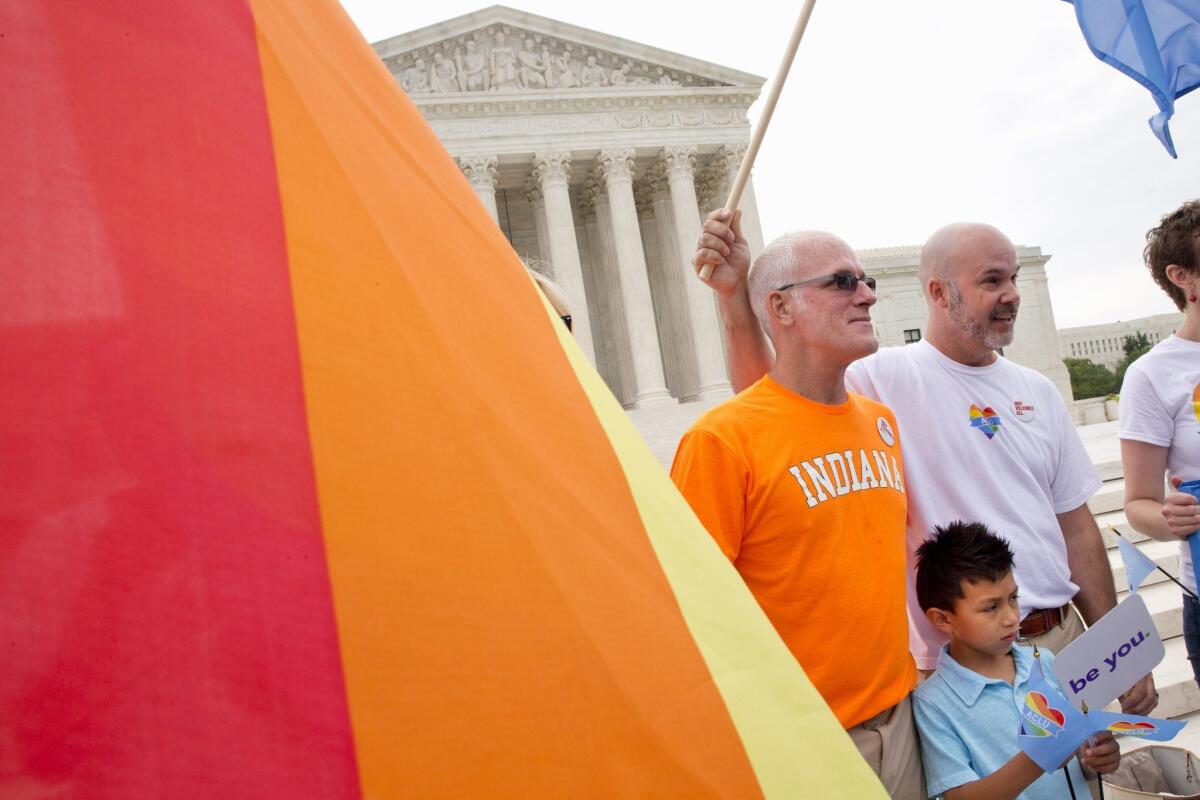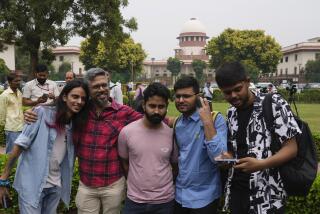Opinion: Gay marriage affirmed amid an eloquent battle of words and visions

Rodney Moubray-Carrico and Scott Moubray-Carrico, who are among the Indiana plaintiff’s, stand with their son Lucas, 7, outside of the Supreme Court in Washington on Friday. The Court narrowly affirmed, in occasionally eloquent terms, their right to be married.
Any nonlawyer who has spent much time reading court decisions knows what an eye-glazing slog they can be. Some jurists, though, write with flair and style, and today’s Supreme Court decision recognizing the fundamental right of gays to marry offers a great opportunity to measure some of the contrasts.
In fact, three of the five opinions form a rather eloquent, sometimes haughty and occasionally stodgy debate over the role of the court, the nature and history of marriage, and judicial elitism and hubris, with references to Confucius, Cicero and Faulkner: “The past is never dead. It’s not even past.” (The other two dissents, by Justices Clarence Thomas and Samual Alito, are less stylistically engaging).
First we have Justice Anthony M. Kennedy, who wrote the 5-4 majority opinion with a sparse eloquence. Here he reaches into the history of marriage (citations throughout omitted):
“The centrality of marriage to the human condition makes it unsurprising that the institution has existed for millennia and across civilizations. Since the dawn of history, marriage has transformed strangers into relatives, binding families and societies together. Confucius taught that marriage lies at the foundation of government. This wisdom was echoed centuries later and half a world away by Cicero, who wrote, ‘The first bond of society is marriage; next, children; and then the family.’ There are untold references to the beauty of marriage in religious and philosophical texts spanning time, cultures, and faiths, as well as in art and literature in all their forms. It is fair and necessary to say these references were based on the understanding that marriage is a union between two persons of the opposite sex.
“That history is the beginning of these cases. The respondents say it should be the end as well. To them, it would demean a timeless institution if the concept and lawful status of marriage were extended to two persons of the same sex. Marriage, in their view, is by its nature a gender-differentiated union of man and woman. This view long has been held — and continues to be held — in good faith by reasonable and sincere people here and throughout the world.
“The petitioners acknowledge this history but contend that these cases cannot end there. Were their intent to demean the revered idea and reality of marriage, the petitioners’ claims would be of a different order. But that is neither their purpose nor their submission. To the contrary, it is the enduring importance of marriage that underlies the petitioners’ contentions. This, they say, is their whole point. Far from seeking to devalue marriage, the petitioners seek it for themselves because of their respect — and need — for its privileges and responsibilities. And their immutable nature dictates that same-sex marriage is their only real path to this profound commitment.”
Kennedy goes into the legal case history of marriage, and affirms that “the right to personal choice regarding marriage is inherent in the concept of individual autonomy,” which should ring for conservatives who cherish individual freedoms. And then his final paragraph:
“No union is more profound than marriage, for it embodies the highest ideals of love, fidelity, devotion, sacrifice, and family. In forming a marital union, two people become something greater than once they were. As some of the petitioners in these cases demonstrate, marriage embodies a love that may endure even past death. It would misunderstand these men and women to say they disrespect the idea of marriage. Their plea is that they do respect it, respect it so deeply that they seek to find its fulfillment for themselves. Their hope is not to be condemned to live in loneliness, excluded from one of civilization’s oldest institutions. They ask for equal dignity in the eyes of the law. The Constitution grants them that right.”
To which Chief Justice John G. Roberts, in one of four dissents, says not so fast on the constitutional thing in a style that is clear but that at times reads like a term paper on the historical definitions of marriage. Roberts argues, among other things, that the Supreme Court overstepped into what should be a legislative decision. From the opening:
“Petitioners make strong arguments rooted in social policy and considerations of fairness. They contend that same-sex couples should be allowed to affirm their love and commitment through marriage, just like opposite-sex couples. That position has undeniable appeal; over the past six years, voters and legislators in eleven States and the District of Columbia have revised their laws to allow marriage between two people of the same sex.
“But this Court is not a legislature. Whether same-sex marriage is a good idea should be of no concern to us. Under the Constitution, judges have power to say what the law is, not what it should be. The people who ratified the Constitution authorized courts to exercise ‘neither force nor will but merely judgment.’
“Although the policy arguments for extending marriage to same-sex couples may be compelling, the legal arguments for requiring such an extension are not. The fundamental right to marry does not include a right to make a State change its definition of marriage. And a State’s decision to maintain the meaning of marriage that has persisted in every culture throughout human history can hardly be called irrational. In short, our Constitution does not enact any one theory of marriage. The people of a State are free to expand marriage to include same-sex couples, or to retain the historic definition.”
Roberts argues that the court’s decision stops the evolution of the democratic political process, with the court imposing a will rather than letting it rise organically among the citizens (never mind the states that have pushed back with gay-marriage bans, and thus the need for the court to recognize a constitutional right):
“Indeed, however heartened the proponents of same-sex marriage might be on this day, it is worth acknowledging what they have lost, and lost forever: the opportunity to win the true acceptance that comes from persuading their fellow citizens of the justice of their cause. And they lose this just when the winds of change were freshening at their backs.”
Then his final paragraph:
“If you are among the many Americans — of whatever sexual orientation — who favor expanding same-sex marriage, by all means celebrate today’s decision. Celebrate the achievement of a desired goal. Celebrate the opportunity for a new expression of commitment to a partner. Celebrate the availability of new benefits. But do not celebrate the Constitution. It had nothing to do with it.”
Then comes Justice Antonin Scalia, the Court’s resident verbal bomb-thrower, whose muscular dissent also was built on the idea that the Supreme Court was sticking its nose in where it doesn’t belong, and creating liberties that don’t exist (he also takes a slap at California):
“A system of government that makes the People subordinate to a committee of nine unelected lawyers does not deserve to be called a democracy.
“Judges are selected precisely for their skill as lawyers; whether they reflect the policy views of a particular constituency is not (or should not be) relevant. Not surprisingly then, the Federal Judiciary is hardly a cross-section of America. Take, for example, this Court, which consists of only nine men and women, all of them successful lawyers who studied at Harvard or Yale Law School. Four of the nine are natives of New York City. Eight of them grew up in east- and west-coast States. Only one hails from the vast expanse in-between. Not a single Southwesterner or even, to tell the truth, a genuine Westerner (California does not count). Not a single evangelical Christian (a group that comprises about one quarter of Americans), or even a Protestant of any denomination. The strikingly unrepresentative character of the body voting on today’s social upheaval would be irrelevant if they were functioning as judges, answering the legal question whether the American people had ever ratified a constitutional provision that was understood to proscribe the traditional definition of marriage. But of course the Justices in today’s majority are not voting on that basis; they say they are not. And to allow the policy question of same-sex marriage to be considered and resolved by a select, patrician, highly unrepresentative panel of nine is to violate a principle even more fundamental than no taxation without representation: no social transformation without representation.”
Describing the ruling as a “judicial Putsch,” Scalia accused the majority of hubris, and then becomes a literary critic of Kennedy and, oddly, argues that marriage squelches individual voices:
“The opinion is couched in a style that is as pretentious as its content is egotistic. It is one thing for separate concurring or dissenting opinions to contain extravagances, even silly extravagances, of thought and expression; it is something else for the official opinion of the Court to do so. Of course the opinion’s showy profundities are often profoundly incoherent. ‘The nature of marriage is that, through its enduring bond, two persons together can find other freedoms, such as expression, intimacy, and spirituality.’ (Really? Who ever thought that intimacy and spirituality [whatever that means] were freedoms? And if intimacy is, one would think Freedom of Intimacy is abridged rather than expanded by marriage. Ask the nearest hippie. Expression, sure enough, is a freedom, but anyone in a long-lasting marriage will attest that that happy state constricts, rather than expands, what one can prudently say.)”
As James Baldwin once said, “all art is a kind of confession,” and the art of Scalia’s dissent may have revealed more about life in the Scalia household than the justice intended. Then Scalia’s final paragraph:
“Hubris is sometimes defined as o’erweening pride; and pride, we know, goeth before a fall. The Judiciary is the ‘least dangerous’ of the federal branches because it has ‘neither Force nor Will, but merely judgment; and must ultimately depend upon the aid of the executive arm’ and the States, ‘even for the efficacy of its judgments.’ With each decision of ours that takes from the People a question properly left to them — with each decision that is unabashedly based not on law, but on the ‘reasoned judgment’ of a bare majority of this Court — we move one step closer to being reminded of our impotence.”
On the contrary, the “bare majority” just recognized that, in fact, all are created equal, and are entitled to the same protections and benefits under the law as anyone else. Which sounds emblematic of our national aspirations, even if we don’t achieve them as often as we should.
Follow Scott Martelle on Twitter @smartelle.
More to Read
A cure for the common opinion
Get thought-provoking perspectives with our weekly newsletter.
You may occasionally receive promotional content from the Los Angeles Times.







